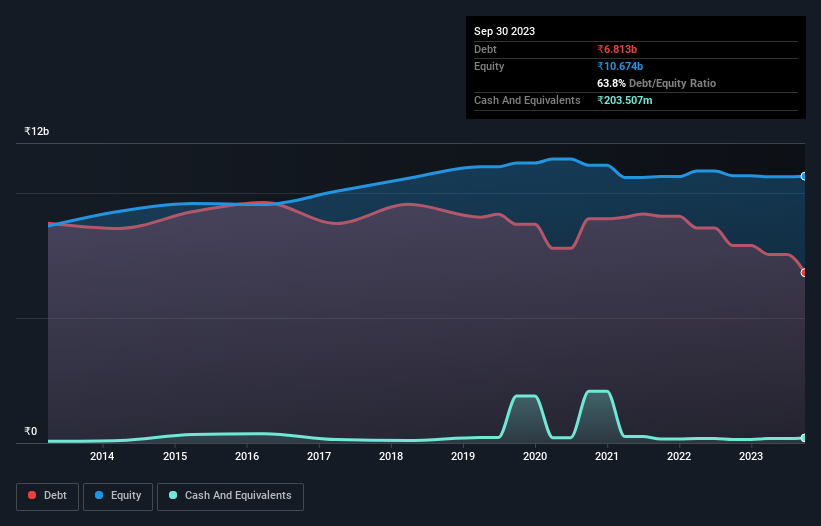Does Nectar Lifesciences (NSE:NECLIFE) Have A Healthy Balance Sheet?

Warren Buffett famously said, 'Volatility is far from synonymous with risk.' So it might be obvious that you need to consider debt, when you think about how risky any given stock is, because too much debt can sink a company. Importantly, Nectar Lifesciences Limited (NSE:NECLIFE) does carry debt. But should shareholders be worried about its use of debt?
When Is Debt A Problem?
Debt and other liabilities become risky for a business when it cannot easily fulfill those obligations, either with free cash flow or by raising capital at an attractive price. Part and parcel of capitalism is the process of 'creative destruction' where failed businesses are mercilessly liquidated by their bankers. However, a more frequent (but still costly) occurrence is where a company must issue shares at bargain-basement prices, permanently diluting shareholders, just to shore up its balance sheet. Of course, debt can be an important tool in businesses, particularly capital heavy businesses. When we examine debt levels, we first consider both cash and debt levels, together.
View our latest analysis for Nectar Lifesciences
What Is Nectar Lifesciences's Net Debt?
As you can see below, Nectar Lifesciences had ₹6.81b of debt at September 2023, down from ₹7.90b a year prior. However, it does have ₹203.5m in cash offsetting this, leading to net debt of about ₹6.61b.

A Look At Nectar Lifesciences' Liabilities
The latest balance sheet data shows that Nectar Lifesciences had liabilities of ₹8.85b due within a year, and liabilities of ₹1.91b falling due after that. Offsetting this, it had ₹203.5m in cash and ₹3.00b in receivables that were due within 12 months. So its liabilities outweigh the sum of its cash and (near-term) receivables by ₹7.55b.
This deficit is considerable relative to its market capitalization of ₹7.66b, so it does suggest shareholders should keep an eye on Nectar Lifesciences' use of debt. Should its lenders demand that it shore up the balance sheet, shareholders would likely face severe dilution.
In order to size up a company's debt relative to its earnings, we calculate its net debt divided by its earnings before interest, tax, depreciation, and amortization (EBITDA) and its earnings before interest and tax (EBIT) divided by its interest expense (its interest cover). The advantage of this approach is that we take into account both the absolute quantum of debt (with net debt to EBITDA) and the actual interest expenses associated with that debt (with its interest cover ratio).
Nectar Lifesciences shareholders face the double whammy of a high net debt to EBITDA ratio (8.1), and fairly weak interest coverage, since EBIT is just 0.28 times the interest expense. The debt burden here is substantial. Worse, Nectar Lifesciences's EBIT was down 70% over the last year. If earnings keep going like that over the long term, it has a snowball's chance in hell of paying off that debt. There's no doubt that we learn most about debt from the balance sheet. But it is Nectar Lifesciences's earnings that will influence how the balance sheet holds up in the future. So if you're keen to discover more about its earnings, it might be worth checking out this graph of its long term earnings trend.
Finally, while the tax-man may adore accounting profits, lenders only accept cold hard cash. So we clearly need to look at whether that EBIT is leading to corresponding free cash flow. Over the last three years, Nectar Lifesciences actually produced more free cash flow than EBIT. That sort of strong cash conversion gets us as excited as the crowd when the beat drops at a Daft Punk concert.
Our View
To be frank both Nectar Lifesciences's interest cover and its track record of (not) growing its EBIT make us rather uncomfortable with its debt levels. But at least it's pretty decent at converting EBIT to free cash flow; that's encouraging. We're quite clear that we consider Nectar Lifesciences to be really rather risky, as a result of its balance sheet health. For this reason we're pretty cautious about the stock, and we think shareholders should keep a close eye on its liquidity. When analysing debt levels, the balance sheet is the obvious place to start. However, not all investment risk resides within the balance sheet - far from it. Case in point: We've spotted 3 warning signs for Nectar Lifesciences you should be aware of, and 2 of them can't be ignored.
When all is said and done, sometimes its easier to focus on companies that don't even need debt. Readers can access a list of growth stocks with zero net debt 100% free, right now.
Valuation is complex, but we're here to simplify it.
Discover if Nectar Lifesciences might be undervalued or overvalued with our detailed analysis, featuring fair value estimates, potential risks, dividends, insider trades, and its financial condition.
Access Free AnalysisHave feedback on this article? Concerned about the content? Get in touch with us directly. Alternatively, email editorial-team (at) simplywallst.com.
This article by Simply Wall St is general in nature. We provide commentary based on historical data and analyst forecasts only using an unbiased methodology and our articles are not intended to be financial advice. It does not constitute a recommendation to buy or sell any stock, and does not take account of your objectives, or your financial situation. We aim to bring you long-term focused analysis driven by fundamental data. Note that our analysis may not factor in the latest price-sensitive company announcements or qualitative material. Simply Wall St has no position in any stocks mentioned.
About NSEI:NECLIFE
Nectar Lifesciences
Manufactures and sells pharmaceutical products in India and internationally.
Solid track record with adequate balance sheet.
Market Insights
Community Narratives



